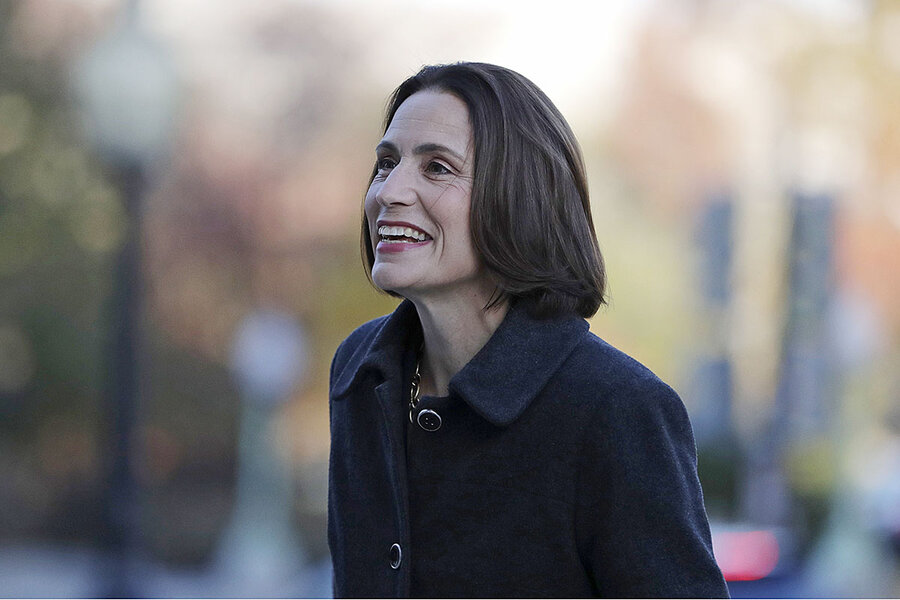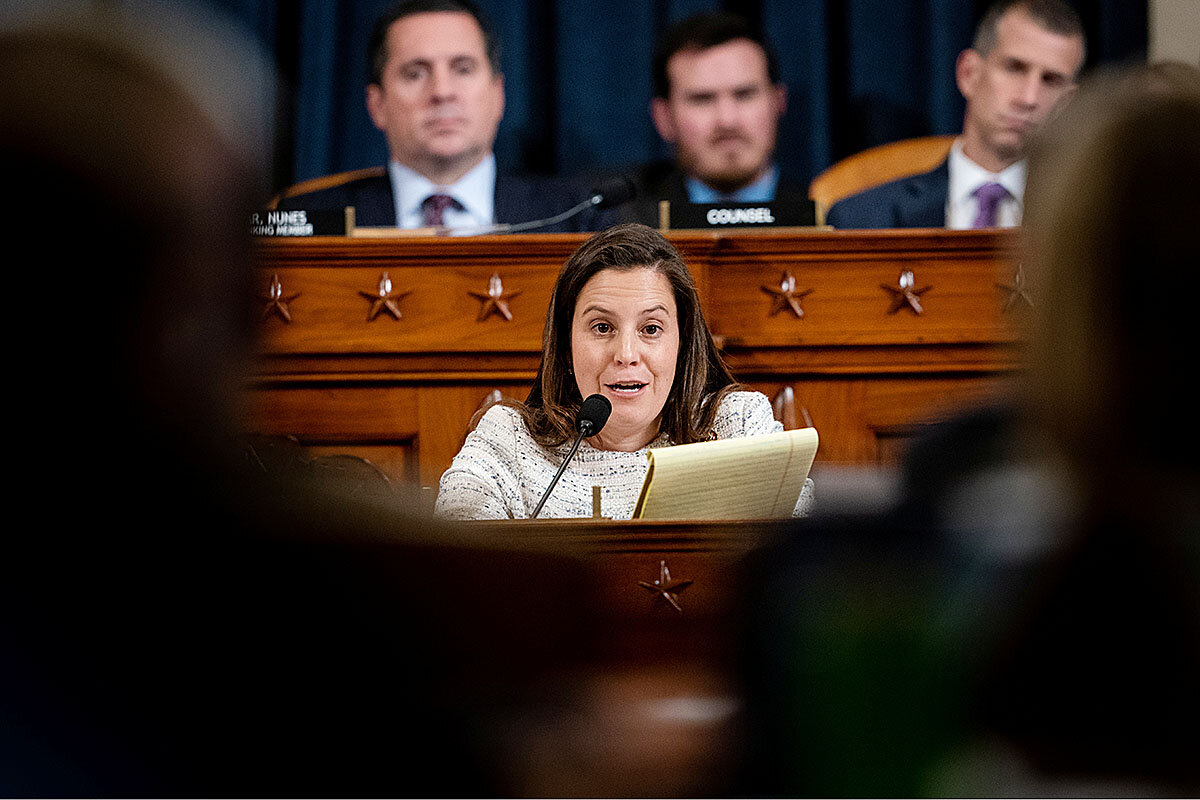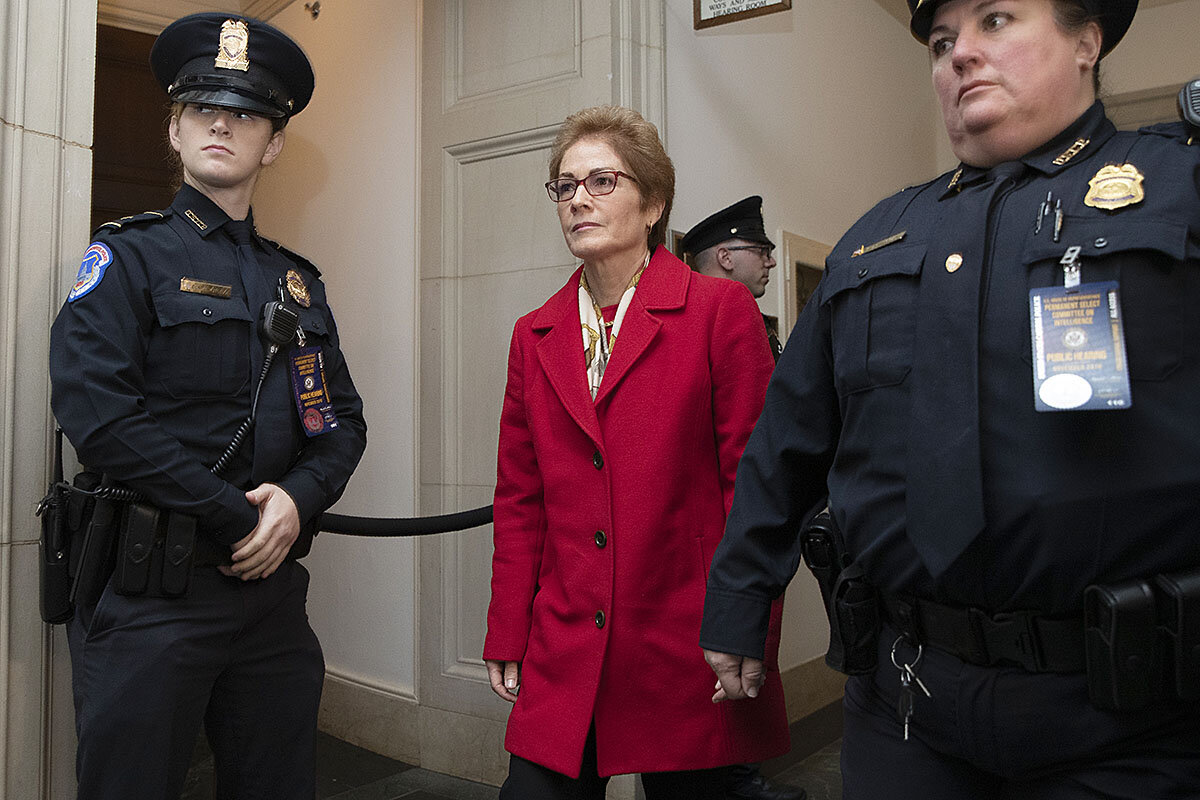Impeachment’s rock stars: Powerful women
Loading...
| Washington
When top Russia expert Fiona Hill appeared before the House Intelligence Committee Thursday, she became the latest in a series of powerful, professional women on both sides of the dais who have emerged as major figures in the impeachment investigation into President Donald Trump.
From veteran civil servants to outspoken lawmakers, women have held a prominence throughout these proceedings that stands in contrast to other high-profile congressional hearings – in large part because their roles have had nothing to do with their gender.
Women were vital to breaking the Watergate scandal, but few saw national recognition for it (think: “All the President’s Men”). They were far more visible during the Clinton impeachment, but many had to wrestle with stereotypes of victimhood.
Why We Wrote This
One striking aspect of the impeachment hearings is the way they’ve showcased the experience and intellect of professional women. Regardless of the political outcome, women’s advocates say that’s significant.
Gender dynamics were a primary feature of high-wattage confirmation hearings for Supreme Court nominees that featured women testifying: Anita Hill detailing charges of sexual harassment by Clarence Thomas in 1991, and Christine Blasey Ford recounting an alleged past sexual assault by Brett Kavanaugh in 2018.
The contrast is all the more notable, because gender has had particular resonance throughout the Trump presidency. Women have been among the president’s loudest critics, from the Women’s Marches that swept the country after his inauguration to the suburban women who led the Democratic wave during the 2018 midterms. They have also been among his fiercest defenders, including his daughter Ivanka and adviser Kellyanne Conway, who became the first woman to manage a winning presidential campaign.
The Trump era began with a female nominee failing to break the presidential glass ceiling, and now features a record number of women running for the White House. Misogyny has been uncovered in workplaces, government, and online, and a hashtag has taken down a number of powerful men.
In such a gender-sensitive environment, it has been striking, observers say, to see women calmly showcasing their experience, expertise, and political savvy in a high-stakes affair that has nothing to do with gender.
“It’s not a #MeToo situation. It’s something constitutional. It’s something that has to do with national security and foreign policy,” says Betsy Fischer Martin, executive director of the Women and Politics Institute at American University. “We see these smart, powerful, articulate women on both sides of the aisle talking about their professional insights.”
The civil servants
In her measured, no-nonsense style, Dr. Hill on Thursday laid out for House lawmakers the concerns she had over the Trump administration’s backdoor Ukraine policy, as well as her frustration with some lawmakers’ efforts to push a discredited theory that it was Ukraine – rather than Russia – who meddled in the 2016 election. Russia seeks to benefit from a divided United States, “consumed by partisan rancor,” she added, while reminding the committee multiple times of her nonpartisan role.
“I have no interest in advancing the outcome of your inquiry in any particular direction, except toward the truth,” said Dr. Hill in her opening statement.
Dr. Hill had long been among the nation’s top experts on Vladimir Putin’s Russia before she was appointed to the White House National Security Council in 2017. She recognized Mr. Putin’s enduring hold on the Russian state before many of her peers, says Matthew Rojansky, director of the Wilson Center’s Kennan Institute. And while it’s difficult to say that any single book can define an entire field, he adds, the two volumes Dr. Hill co-authored on the subject come close.
“It’s not an exaggeration to say she is universally respected in the field,” says Mr. Rojansky, himself a Russia expert who’s long admired Dr. Hill’s work. “She has been a real fixture in the intellectual discourse about Russia … [and] a serious policy practitioner. You just can’t say all of those things about many people, in any administration.”
Dr. Hill’s credentials make her a heavyweight in a witness lineup that has included top diplomats and government officials, like Gordon Sondland, the U.S. ambassador to the European Union, and the former U.S. ambassador to Ukraine, William Taylor.
Other women who’ve testified have also held their own. Jennifer Williams, who appeared Wednesday, is a State Department official who serves as Vice President Mike Pence’s lead Russia adviser. Laura Cooper, who also testified Wednesday, is deputy assistant secretary of defense for Russia, Ukraine, and Eurasia at the Pentagon.
Former Ambassador to Ukraine Marie Yovanovitch, who spoke to the committee last Friday, is one of the longest-serving women in the U.S. Foreign Service. She worked as a diplomat under both Presidents George W. Bush and Barack Obama, as well as Mr. Trump.
“The women being called in are not administrative assistants who might have heard something” but accomplished experts, says Jennifer Lawless, a professor of politics at the University of Virginia who’s written extensively about women in office. “That matters, that level of growth.”
Their qualifications haven’t spared them from attacks. While Ambassador Yovanovitch was on the stand, Mr. Trump sent a tweet that questioned her abilities, asserting that everywhere she went “turned bad.” The missive added weight to Ms. Yovanovitch’s testimony that her unceremonious recall from Ukraine came along with an attempt to smear her reputation.
On Thursday, David Holmes, who served as Ambassador Yovanovitch’s chief policy adviser in Kyiv, testified in his opening statement about his “deep respect for her dedication, determination, decency, and professionalism.” He added that the “barrage of allegations” leveled against her were “unlike anything I have seen in my professional career.”
To be sure, Mr. Trump often treats his perceived enemies this way, regardless of their gender. But observers say there was a certain force to seeing a successful woman gracefully fend off such attacks in real time.
“No one would say that Yovanovitch’s testimony was anything less than a master class in integrity-led leadership,” says Jenna Ben-Yehuda, founder of the Women’s Foreign Policy Network, a global organization for women in foreign affairs. “It shows that leadership takes many forms. I hope we hold on to that.”
When Ms. Yovanovitch’s hearing wrapped on Friday, she received a standing ovation from the audience.
The politicians
Women lawmakers have also been front-and-center in the impeachment drama.
Florida Rep. Val Demings, one of three Democrats on the panel, came out hard against Ambassador Sondland on Wednesday, pressing him on the details of a phone conversation he had with Mr. Trump at a restaurant in Kyiv. California Rep. Jackie Speier – who as a congressional aide in the 1970s came under gunfire while investigating the Jonestown cult in Guyana – played a key role in the depositions of Ambassador Taylor and State Department official George Kent, according to transcripts. And Rep. Terri Sewell, the No. 3 Democrat on the panel and the first black woman to serve Alabama in Congress, has also been a vocal interrogator.
Yet it’s New York Rep. Elise Stefanik, the lone Republican woman on the committee, who has drawn the most attention.
On Friday, she sparred with Democratic committee chair Adam Schiff after he shut her down for trying to ask a question before her designated time. She came back with a jab: “Will you be prohibiting witnesses from answering members’ questions, as you have in the closed-door depositions?” Mr. Schiff responded that he was protecting the identity of the whistleblower who first brought attention to Mr. Trump’s now-famous July 25 call with Mr. Zelenskiy.
“We are here to talk about impeachment – and nothing in that room today, and nothing in that room this week, nothing rises to the level of impeachable offenses,” Ms. Stefanik later told reporters.
The episode earned Ms. Stefanik public praise from the president, who called her “a new Republican star.”
“Elise has been a rock star,” agreed Republican National Committee Chair Ronna McDaniel at a Monitor Breakfast Thursday. “She’s been incredibly succinct in her questioning. She’s come prepared. ... I think she’s been excellent.” She added: “And I think she drives Adam Schiff nuts.”
Indeed, Democrats have roundly criticized Ms. Stefanik as a partisan warrior. But others say her credentials make her a powerful messenger for Republicans. Ms. Stefanik was the youngest woman in Congress when, at 30, she was first elected in 2014. She went on to develop a reputation as a moderate, voting against the GOP tax cuts in 2017, and sounding the alarm about the growing gender disparity in her party’s congressional caucus. She also has not been afraid to criticize Mr. Trump.
“They recognize that she’s a different voice and she has some credibility – not just because of gender or her younger age, but because she’s not been that falling-in-line sort of member,” says American University’s Ms. Fischer Martin. “It’s not at all a tokenism kind of thing.”
Behind the scenes
Less visible since the public hearings began has been House Speaker Nancy Pelosi. But it’s hard to overstate the part she’s played in these events. Her hand is in every decision the Democrats have made, from whether or not to move forward with the inquiry, to which committee would lead the investigation, to the scope of the probe.
“If we think of impeachment as the biggest, or most significant, check that Congress has on the executive branch, then we have a woman orchestrating that check,” says the University of Virginia’s Professor Lawless. “That’s not something we’ve seen before.”
In terms of the political impact, the impeachment hearings have been – and will likely continue to be – highly divisive, a process that may only confirm Americans’ impression of Washington as a partisan swamp. But “in terms of gender dynamics,” Professor Lawless says, the impact may be far more positive.
“If for nothing else, they’ve proven that women on the left and the right are asking the tough questions, and are getting answers,” adds Olivia Perez-Cubas, spokesperson for the Winning For Women Action Fund, which recruits Republican women to run for office. “Between the women who have testified, between Elise, between Pelosi – they are shapers of this entire argument.”
“Kudos to them.”







